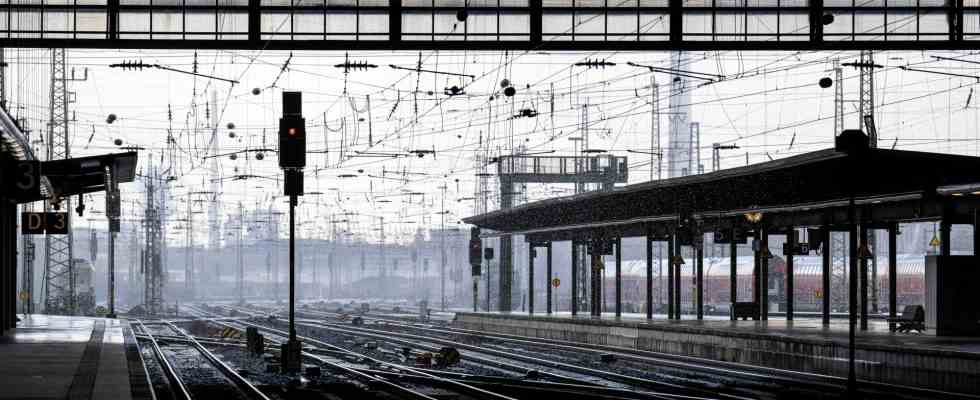Status: 03/27/2023 7:02 p.m
Traffic in Germany is slowly picking up again at night after the end of the nationwide warning strike. But even today, travelers still have to be prepared for delays, especially in the morning.
After the 24-hour warning strike by the trade unions ver.di and EVG, public transport by rail, water and air in Germany is gradually starting up again.
However, passengers, especially on long-distance Deutsche Bahn trains, still have to be prepared for train cancellations and delays for some time, as a railway spokesman said. It takes a few hours for the ICE and IC trains and the staff to get to where they are needed.
To a lesser extent, there may also be restrictions in regional and S-Bahn traffic. Even at the airports, things are not likely to start up smoothly again right away.
The opinion of Daniel Pokraka, BR, on the strike day in Germany
daily topics 10:15 p.m., 28.3.2023
Further delays are also possible at airports
Almost all German commercial airports except Berlin were affected by the joint warning strike by the trade union ver.di and the railway and transport union on Monday.
It is possible that there will be longer waiting times on Tuesday, said the spokesman for Germany’s largest airport in Frankfurt. Passengers should be prepared for any delays in operations, check the status of their flight in good time and allow enough time.
Major strike in public transport
Philipp Wundersee, WDR, daily topics 10:15 p.m., March 27, 2023
EVG rules out strike around Easter
The EVG, together with ver.di, had called for a warning strike in the transport sector nationwide in the respective collective bargaining conflicts. The two unions wanted to significantly increase the pressure on employers by interlacing the various collective bargaining conflicts.
At the start of the third round of negotiations for public sector employees in Potsdam, given the hardened fronts, it was completely unclear whether a breakthrough could be achieved. The good news for many commuters and travelers: EVG has ruled out another warning strike before and during Easter.
No chaos on the road
However, the warning strike did not result in the feared chaos on the road. Numerous commuters switched to working from home and many travelers postponed their journeys. Only a few passengers were stranded at the airports and train stations during the strike.
The EVG struck long-distance, regional and S-Bahn traffic. Long-distance traffic was completely discontinued, regional traffic for the most part. Railway competitors who were not on strike were also affected because employees in the DB Netz signal boxes stopped working.
380,000 air travelers stayed on the ground
Ver.di meanwhile caused a standstill at several airports, in local transport and also on waterways. There were no regular passenger operations at the largest German airport in Frankfurt. About 1170 take-offs and landings with around 160,000 passengers were originally planned there. 785 flights were canceled in Munich.
According to the Working Group of German Commercial Airports (ADV), a total of 380,000 business and private travelers had to stay on the ground. At airports, public sector employees are involved in the warning strike, but there are also negotiations for ground handling services and talks about aviation security.
The situation of the strikers using the example of baggage processing at Munich Airport
Alf Meier, BR, daily news at 8:00 p.m., March 27, 2023
Dbb boss warns against indefinite strike
With regard to the collective bargaining for the public sector, ver.di boss Frank Werneke called on employers to take “a clear step” towards the employees. The employers, however, called on the unions to seriously negotiate the present offer. According to Karin Welge, President of the Association of Municipal Employers’ Associations (VKA), there is no need for a new offer.
Ver.di and the civil servants’ association dbb have been negotiating with the federal and local governments since January about the incomes of millions of employees. Dbb boss Ulrich Silberbach brought a possible failure of the negotiations into play and already warned of a nationwide, indefinite strike.
At the EVG, which is negotiating new collective agreements with 50 railway companies in parallel, the second round of collective bargaining begins on Wednesday, with negotiations then taking place with the Osthannoversche Eisenbahn. The next talks with Deutsche Bahn are not scheduled for the end of April. The union negotiates at the federally owned group for around 180,000 employees.
Before the third tariff round
Ver.di and the civil servants’ association dbb are demanding 10.5 percent more income over 12 months, at least 500 euros more, for the 2.5 million employees of the municipalities and the federal government. Employers do not want a minimum amount – and offer 5.0 percent more wages over 27 months.
Strike: Higher costs for all citizens?
Evi Seibert, ARD Berlin, March 27, 2023 7:06 a.m

